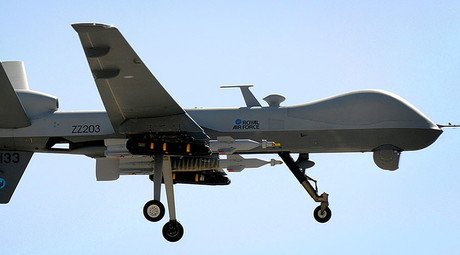US court blocks release of memos justifying targeted drone killings of American citizens abroad

The controversial subject of US targeted drone killings came up again, as an appeals court blocked the initiative to disclose documents that tackle the legality of using unmanned vehicles to kill American terror suspects abroad.
The 22-page decision was unsealed on Monday, as the 2nd US Circuit Court of Appeals was in the second round of examining Freedom of Information requests filed by the American Civil Liberties Union and the New York Times. The first round led to the disclosure of a redacted version of a 2010 Justice Department document that provided legal justification for the secretive program.
The reason given by the federal court for acting differently this time was that in the previous situation, the case had already been made too public by the numerous statements of top officials given shortly after the document was penned. Those included President Obama’s.
However, the October 22 decision unsealed on Monday largely upheld the October 31 decision of last year. Circuit Judge Jon O. Newman’s decision was read by the three-judge appeals panel. It noted that the 2002 document providing legal counsel to the president’s legal adviser will remain sealed, as it did not generate any public statements from top US officials until eight years after it was written.
ACLU and Times attorneys argued in their latest appeal that the secret memos pertain to “working law,” and should therefore be released.
Newman saw it differently: "At most, they provide, in their specific contexts, legal advice as to what a department or agency 'is permitted to do' ... and its advice 'is not the law of an agency unless the agency adopts it',” the judge wrote, citing a federal court decision from 2014, according to Reuters.
READ MORE: Leaked: 'New Snowden' releases Obama's drone program papers
The decision has led to alarm among information advocates, who believe the justifications for such a dangerous program are only vaguely explained to the public.
"In a democracy, there should be no room for 'secret law,' and the courts should not play a role in perpetuating it,” ACLU Deputy Legal Director Jameel Jaffer said in a statement. "As President Obama considers his legacy and the certainty that the targeted-killing program will soon be in the hands of a new president, we urge the administration to disclose more information about the program and subject it to stronger oversight,” he added.
"The government should not be using lethal force based on standards that are explained only vaguely and on facts that are never published or independently reviewed," Jaffer said.
The ACLU and the Times made the FOI request for the document in 2011, following September and October drone strikes in Yemen that killed a US-born Al-Qaeda leader together with another citizen, Samir Khan, and Abdulrahman al-Awlaki, his son, also a US citizen.
The debate rages on about whether US citizens accused of terrorism abroad deserve a fair trial. So far, the biggest complaint from rights advocates has been the denial of those basic rights.













